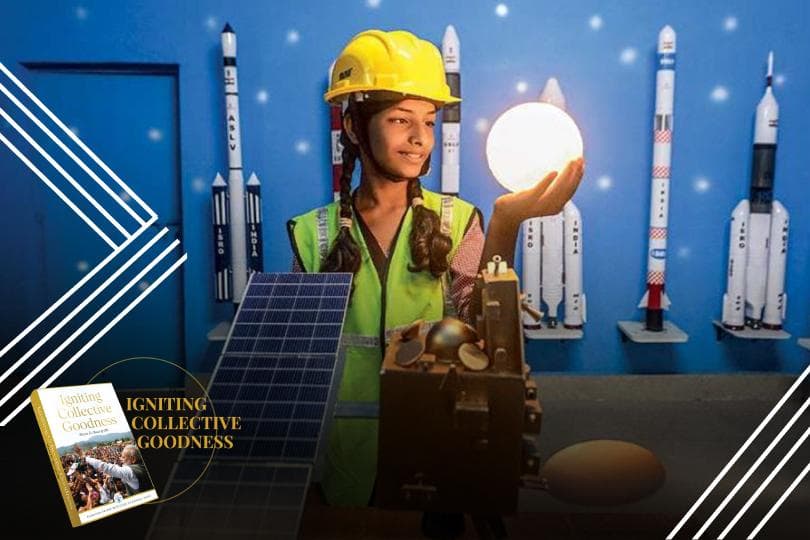Modi's Secret to a High-Tech India Revealed!
How PM Narendra Modi's innovation revolution is transforming India into a tech powerhouse

In Prime Minister Narendra Modi's Budget Session Address to the Rajya Sabha in February 2023, he summarised his country's stance toward innovation, stating, "We are using technology for empowering common citizens."
As I review Chapter 10 of "Igniting Collective Goodness," it's clear that Mann Ki Baat@100 repeatedly reinforces this directive. However, its emphasis is most apparent in the section on “Tinkering Labs.” The establishment of 10,000 Tinkering Labs across India has granted students access to the materials and support they need to address community challenges. Mann Ki Baat has facilitated direct dialogue between Tinkering Labs participants and the Prime Minister himself, fostering a nationwide conversation on innovation. This focus on innovation is crucial for education and instils a mindset that prepares children for a future in a rapidly evolving society, where yesterday's knowledge may not apply today. The significant cross-fertilisation of ideas through open-format sharing has accelerated the development of important ideas and inventions, allowing them to be shared across the continent.
“Time and again, the Prime Minister has asserted that science and technology are value-neutral. 'They don’t possess any value in themselves. A machine will work the way we want it to. The tasks we choose to perform depend entirely on us. What is truly significant is the purpose or ‘human objectives.’ Among the noblest of these is the use of science for the purpose of human welfare,'” (Igniting Collective Goodness, Chapter 10).
Modi has a unique way of connecting with his people's initial experiences with science: “My dear countrymen, there is hardly anyone who has not been fascinated by the sky. During one’s childhood, stories of the moon and the stars captivate everyone. For the youth, reaching for the sky is synonymous with realising dreams. Today, as India achieves success in numerous fields, how can space remain untouched?”
Wind Cdr (Retd.) Rakesh Sharma, one of India’s space pioneers, remarked, “Everybody says space is the last frontier, and we are among the leading nations. We have achieved remarkable success. However, I wouldn’t say space exploration is coming to an end, even though ISRO (Indian Space Research Organization) has realised the original dreams. We have now begun to explore our celestial neighbourhood. So, I would say the sky is not the limit; there is much more to achieve in space in the years to come.”
When discussing the historical feat of launching 104 satellites simultaneously, the Prime Minister highlights the significance of one satellite in particular, "Brothers and sisters, one of these 104 satellites, the Cartosat-2D, is exceptionally important for India. The images it captures will greatly assist in resource mapping, infrastructure evaluation, development assessment, and urban planning. Particularly for our farmer brothers and sisters, the Cartosat-2D will be immensely beneficial in various aspects, including the assessment of water availability in our water sources…”
Dr Tessy Thomas, speaking with PM Modi on the programme Mann Ki Baat, emphasises, "The sustained efforts of our scientists and technologists have made the country an emerging power in several areas, propelling us into the elite club of nations with a presence in space, defence, and nuclear technologies. Our major space missions, such as Chandrayaan, Mangalyaan, the development of cryogenic engines, and launch vehicles like PSLV (Polar Satellite Launch Vehicle) and GSLV (Geosynchronous Satellite Launch Vehicle), have established a whole new domain of technology indigenously. The DRDO (Defence Research and Development Organization) is committed to enhancing India's self-reliance in defence systems and is involved in the design and development leading to the production of world-class weapons systems and equipment,” (Igniting Collective Goodness, Chapter 10).



































